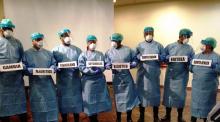Workshop on Ebola preparedness and response conducted for eight unaffected countries in the African Region
Harare, 18 Sept 2014 : “One of the greatest challenges to our current response to ongoing Ebola Virus Disease outbreaks is how to manage the resultant epidemic of fear, panic, myths and misconceptions. But whatever approach we want to adopt for our situation, we must ensure that they are guided by science, documented evidence and international agreements” These were the words of Dr David Okello, WHO Representative in Zimbabwe and IST/ESA Coordinator a.i. during the workshop held at Rainbow Towers, Harare, Zimbabwe from 16- to 18 September, 2014.
The workshop was part of WHO’s continued response efforts to on-going Ebola Virus Disease (EVD) outbreaks in the African Region and brought together 28 participants comprising of Ministry of Health and WHO country office focal persons for Emergency Preparedness and Response (EPR) from 8 unaffected countries namely Eritrea, The Gambia, Lesotho, Mauritius, Seychelles, South Africa, South Sudan and Swaziland. The main focus of the meeting was to support planning for EVD outbreak preparedness in the unaffected countries.
Presentations were made on key areas of Ebola Preparedness and Response. Experiences were shared by WHO consultants who had supported operations in the affected countries. In addition, countries presented the status of EPR in their respective countries and drafted revisions to their existing country plans based on information and guidance received during the workshop. The workshop was facilitated by IST/ESA staff and 2 colleagues from WHO/HQ (Departments of Service Delivery & Safety and Global Capacities Alert & Response). UNICEF colleagues from Zimbabwe also facilitated the Workshop. The 3-day interaction revealed a few lessons on the response efforts in these unaffected countries.
Response efforts, international obligations, science and evidence.
It was interesting to note that countries had variable approaches to defining contacts and that quarantine measures were being used inconsistently to prevent transmission, rapidly detect and provide effective response in case of Ebola transmission. Measures in use ranged from quarantining any traveller arriving from an affected country to restricting entrance. It was reiterated that in this difficult period, we need to sustain solidarity within the Region, reflect more on science and evidence, and pay more attention to the provisions of the International Health Regulations 2005.
Community engagement
Social, cultural and risk communication aspects of Ebola virus disease outbreak preparedness and response were strengthened in the draft plans of the countries based on the information and guidance received during the Workshop. With a lot of the uninfected countries gripped with fear of Ebola and in a state of panic, risk communication activities have to be clearly planned and implemented with greater community engagement. This comprehensive strategy should be used to help manage rumours before they damage the community's trust in the delivery of health services.
Costing of workplans
It has been difficult for the countries to cost the existing emergency preparedness and response plans for Ebola. Although some costing information was used from the WHO Roadmap for Ebola, there is need for technical assistance to countries to be able to develop costed plans that can be used to mobilize funds for implementation. The fact that the eight countries were at different stages in the comprehensiveness details of their plans fostered a rich opportunity for cross-fertilization of ideas.
Confidence Building
Before the workshop some of the participants were unclear about some aspects of the interim recommendations and advice on the current outbreak. The exhaustive technical discussions coupled with field experience shared by those who had participated in Ebola outbreak response operations in all the affected countries, that took place during the 3-days built the confidence of participants to go back home, and strengthen implementation.
Protecting health workers from Ebola
Given the unprecedented number of health workers that have been infected and died in the ongoing outbreaks, countries expressed a keen interest in protecting health workers as, particularly through the use of correct personal protective equipment (PPE) as part of infection prevention and control measures. The proliferation of different PPE types in the market is of concern to countries as they are not sure of the type providing the best protection for their staff. Updated and simplified guidance from WHO on PPEs was requested.
EVD Preparedness: An entry point to strong safe service delivery
All country teams emphasized the need to utilize EVD preparedness to strengthen the safety and quality of their health services. In particular, the role of strong infection prevention and control was highlighted as critical to the long term reduction of preventable harm from health care-associated infections. The need for inter-country exchange of experiences in improving safety and quality of health services was underscored.
The participants expressed gratitude to WHO for organizing the workshop and pledged to use the information and knowledge acquired to improve their countries’ preparedness against the threat of the ongoing Ebola outbreaks. In particular, countries emphasized that the information and knowledge would be cascaded to each of the national teams tasked with EVD preparedness. The meeting ended with a communique from the participants.





